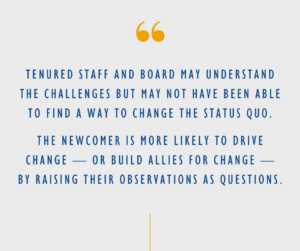The Wisdom of the Naïve
As a long time consultant with nonprofits, I’ve interviewed thousands of staff and board members over the years about their organizations. When asking our clients who we should talk with to learn more about the organization, they easily identify the folks with tenure — those who have seen the organization through its ups and downs, through leadership changes, or through shifts in focus. We are not typically asked to talk with the people new to the organization. In fact, we’re often told some variation of “this new person is really smart and might have insights into the organization they come from, but they don’t really know a lot about our organization yet.”
I love talking with the tenured folks because they bring a deep and nuanced perspective on the organization and are able to provide helpful context to the issues we’re grappling with now.

But I also love talking with the newer people because they inevitably have observations about the organization that are unseen by everyone who’s been around a long time. Their perspective is that of the naïve, which, in this instance, I define as less informed in a way that reduces complexity and allows for a clearer view. The new person is the one who will point with astonishment and say, “the emperor has no clothes!”
For example, it is a new staff member who will tell me that they started employment with the organization because they wanted to work with a particularly talented leader — but that they learned immediately that that this leader was spending all their time on a new initiative and not taking care to share their insights with the new person.
Or it is a new staff member who can’t believe the intake process for clients is so complicated — and who is then able to describe a revamp that immediately and dramatically improves access to services.
Or it is the new board member who describes with absolute directness that the board seems to reach agreement, but that they can’t be certain what they agreed to because they just move on to the next topic without a formal vote or restatement of the conclusion.
Recognizing that people new to a system can have great insights doesn’t, of course, mean that those insights will be translated to change. Often things are the way they are for necessary reasons. Tenured staff and board may understand the challenges but may not have been able to find a way to change the status quo. The newcomer is more likely to drive change — or build allies for change — by raising their observations as questions: How can I best work with you to learn what you know about my program? Are there requirements that drive the way we do an intake? Or, real-time, asking if the conclusion to the conversation can be restated because they’re not sure where everyone landed. A spirit of inquiry and humility goes a long way towards building a desire for change among colleagues.
Finally, for the more tenured members of an organization, take the time to talk with newer folks about their early observations. Three months in ask them about what they see as working well at the organization and what is a challenge. Schedule a formal two-way review at six months that evaluates both the new person’s progress and also the organization’s strengths and needs for change.
Value the wisdom of the naïve before it’s gone, because they won’t retain the clarity of that fresh perspective for long!


Comment section